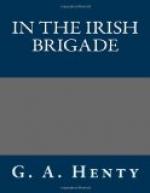“The infantry poured into the gap thus made, Blenheim was entirely isolated, and we were exposed to assault both in front and rear. Nevertheless, we repulsed all attacks, until Marcin sent orders for us to retire; then we sallied out, after setting fire to the village, flung ourselves upon the enemy, and succeeded in cutting our way through, our regiment forming the rear guard. The whole of Marcin’s army were now in full retreat, harassed by the allied cavalry; but whenever their squadrons approached us, we faced about and gave them so warm a reception that they attacked less formidable foes. As for the garrison in Blenheim, you know they were at last surrounded by Marlborough’s whole force, with artillery; and with the Danube in their rear, and no prospect of succour, they were forced to surrender.
“It was a disastrous day, and I have not yet recovered from the wound I received there. Wad five thousand infantry been posted in a redoubt, halfway between Blenheim and Oberglau, so as to give support to our cavalry, the result of the battle would have been very different. Still, I suppose that most battles are lost by some unlooked-for accident—some mistake in posting the troops. We can only say that, had the allied forces been all composed of such troops as those Eugene commanded, they would have been beaten decisively; and that had, on the contrary, Eugene commanded such troops as those under Marlborough, Marcin would never have held his ground.”
“How many British troops were there in the battle, Captain O’Donovan?”
“Somewhere about twelve thousand, while the Continental troops were forty-seven or forty-eight thousand. There is no doubt that they were the backbone of the force, just as we flatter ourselves that our three regiments were the backbone of the defence of Oberglau.”
Chapter 3: A Strange Adventure.
When the party broke up, O’Neil and O’Sullivan, as usual, came in for a quiet chat to Desmond’s room.
“As we may be possibly ordered to Spain,” Kennedy said, “I should like to know a little about what we are going to fight about; for, although I know a good deal about the war in Flanders, no news about that in Spain ever reached Kilkargan.”
“Well, you know, of course,” O’Neil said, “that Philip the Fifth is a grandson of Louis; and is naturally supported by France against the Archduke Charles of Austria, who is competitor for the throne, and who is, of course, supported by England. Six thousand English and Dutch troops were sent to aid the Archduke Charles in his attempt to invade Spain and dethrone Philip. The King of Portugal, who is a member of the allied confederacy, promised to have everything ready to cooperate with them. They found, however, on their arrival, that no preparations had been made, and they were accordingly distributed, for a time, among the garrisons on the frontier.
“Philip, on his part, had not been so inactive, and two armies—the one commanded by the Duke of Berwick, and the other by General Villadarias—invaded Portugal. Berwick surprised and captured two Dutch battalions, and then captured Portalagre, and compelled the garrison, including an English regiment of infantry, to surrender.




